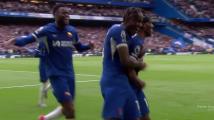Discussing the NFL’s immediate handling of the Damar Hamlin injury | You Pod to Win the Game
Yahoo Sports Charles Robinson, Jori Epstein and Charles McDonald express their thoughts on how the NFL, the Bills, the Bengals and ESPN handled an unprecedented situation on the field in Cincinnati, when a devastating injury created so much supercharged emotion. Hear the full conversation on the You Pod to Win the Game podcast. Subscribe on Apple Podcasts, Spotify, Stitcher or wherever you listen.
Video Transcript
[AUDIO LOGO]
CHARLES ROBINSON: I do think we should, though, talk a little bit about the response. That has drawn a lot of questions. Obviously, the broadcast-- Joe Buck said on air a couple of times that, you know, players are going to have a five-minute warm up and, you know, insinuated the game was going to start again. The league's been hammered on that. Troy Vincent's had, you know, a number of calls-- Vice President of Operations with the league. And there's been a lot of questions about who told ESPN that. Why did that go out on the air-- all these different things. I want to hear both of your opinions on that.
One thing that resonated with me and that I wrote about was that the right decision got made here. Regardless of whether somebody fumbled it along the way, the bottom line was, at some point, the league had to listen. Or whoever was in charge had to just listen. Just listen. What's going on here? And they listened. Zac Taylor having the compassion to look at Sean McDermott and go, nope, we're not gonna communicate through officials. I'm gonna go over there and talk to this guy on the field. And Sean being like, I need to be with Damar Hamlin. I don't need to be coaching this game.
Whatever it was, it had to stop. And it stopped. And to me, I know that there's a gameday ops manual and that there have been multiple times this season where players either leave on a stretcher or leave in an ambulance. It's happened over each year. I don't think we go a year without seeing a player leave in an ambulance now. It's crazy. But there is a sort of, OK, well, we know now how this functions afterward. And I think in the ham-handed probably fog of what's going on, someone asks, well, what's gonna happen here?
And the response that comes is, well, they're gonna warm up. And then we're gonna play, you know? It wasn't the well, let me take in everything. And, you know, it was you get an answer. ESPN repeats it. I can just tell you that the league office-- and I had a chance to talk to a couple of people. When this happened, their reaction was not, like, when do we get this game going? Their reaction was-- I'm paraphrasing here. But it was, holy [BLEEP].
That's what the reaction was. It was like ours. It was terrif-- it was terrifying for them to see this-- and not just because it's something that we have all known the league has had to fear for a long time because of the violence of the game. They're also human beings who were like, oh, my God. Someone's gonna die playing sports on my watch. If you guys want to expound on the five minutes and then the hour-- it's also been a lot of focus on the fact that it took an hour for them to announce the game was going to be not completed and postponed.
Jori, you went through Dak suffering that injury. I remember seeing the emotion of players on that one and at times thinking, like, jeez, how are they gonna go play now? I mean, guy's crying going off the field-- everybody is emotional. That to me is the garden variety stuff now as [BLEEP] up as it is to say that. But that's the-- man, this is a really bad injury.
JORI EPSTEIN: Yeah.
CHARLES ROBINSON: OK, they're gonna start playing again. This was something completely different. And it just seems like it was fumbled a little bit, but maybe even a little understandably because no one had ever seen this before.
JORI EPSTEIN: Right. In some ways, I'm grateful that we didn't know exactly what to do and have experience with this because, if so, that would mean someone else, God forbid, would have suffered an injury like this. I think, first and foremost, if you think about what happened to Damar Hamlin in those moments, I think that should be telling. You don't want to give someone CPR on national television in a field surrounded by, I don't know, 70,000 fans-- how many were there-- with all of his teammates in the vicinity.
But the number one most urgent goal in that situation was to get Damar breathing again when they say they resuscitated him again. I'm not a doctor, but that was the number one goal. And so it's, first, how do we make sure he is going to live? Second, how do you support everyone around him while also going through the medical logistics? And then third, OK, how do you communicate that with your broadcast partners, with the coaches, with ownership, with all of the different constituencies across the league office?
And I think that, certainly, the coaches-- and that being Sean McDermott of the Bills and Zac Taylor of the Bengals-- deserve credit for being very firm. And we saw that on TV-- of, we're not playing again. But I don't think the fact that they did that meant that the league was saying, you are playing again. I think the league was also trying to have communication with the coaches to try and understand what's best for your teams right now.
One speculation I have-- and, again, I don't know this-- is, let's say, on air, Troy and Joe we're told, well, here's what happens if there's a game stoppage. And here's where you go back. And then Joe is trying to explain. Again, he's not left with any great options filling airtime while trying not to traumatize viewers and listeners anymore. So if he's trying to explain, is it that they were getting the five minutes to warm up or that in similar game stoppages this is what happens? And so I think there's kind of all of these situations where, one, as y'all mentioned, let's give a little bit of grace and compassion to everyone involved who were doing their best in that moment.
And, two, we got to where, as you said in your column, Charles, where we needed to be. So do we write up ESPN's response to the league and this and that? And it's almost like if you try and let one say they're right over the other, it suggests that anyone was wrong to begin with. And in a situation where no one has a perfect situation and everyone is doing their best, that's kind of-- I don't know. It feels a little bit callous.
And the last thing I'll say is that Troy Vincent said as early as Monday night-- this was around midnight, about three or four hours after all this happened when he said, "frankly, it never crossed our mind to talk about warming up to resume play. That's ridiculous. That's insensitive. And that's not a place that we should ever be in." I think we shouldn't read that as, and ESPN was. I think we should read that as, ultimately, everyone realized this game is not being played further.
CHARLES MCDONALD: Yeah, the word that we've heard over and over again for the past two days now is, it's unprecedented.
CHARLES ROBINSON: Right.
CHARLES MCDONALD: And that means there's no-- there is no game plan-- no book on how to deal with a moment like this. And I think that-- I was gonna say this, but you said it first, Jori. The word grace-- I think we all need to take a step back and just realize, like, actually, like, what we're dealing with here and the reaction to it from the NFL's side, from the players' side, from the spectators' side.
You know, over the past, like, two days I've just been doing a lot of thinking. And I find myself-- like, I can't get mad at really anyone in this situation-- for the NFL and their response to it, for people's response to the NFL-- because we watched someone potential die on TV. On national TV, we watched it happen. There's cameras.
And that's-- there's so much anguish that is generated from watching an event like that. The emotions are going to be supercharged. I really haven't gotten too caught up on the five minutes or one hour thing or what have you because no one has the game plan for how to deal with this or how to emotionally get through it. And we just need to be nice to each other, I think, right now.







